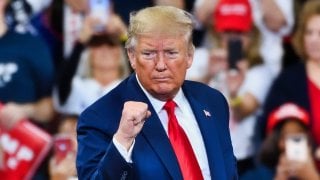Teaching A Man to Fish: Donald Trump’s Second-Term Alliance Policy
Contrary to some fears, a second Trump administration would pursue “peace through strength” with its allies and defend against encroaching authoritarian powers.
American voters trust the GOP more on most of their top priorities and Donald Trump is currently leading in most polls in the battleground states. Many European foreign policy observers find this alarming. Some think that, if he were to become president again, Trump would cede Ukraine to Russia, others that he would take the United States out of NATO, and still others that he would push the world into further chaos in the Middle East and Asia. But are these fears well-founded? After reviewing Trump’s policy track record, the answer is no.
For starters, the Trump administration left Biden a far more stable Middle East than the one he had inherited from Barack Obama. In 2018, Trump withdrew from the ill-conceived nuclear deal with Iran and inaugurated a “maximum pressure” policy on the Tehran regime. He also favored a normalized relationship between Israel and the Sunni countries, which led to the historic Abraham Accords of 2020. Critically, Trump established deterrence against Iran by killing General Qasem Soleimani, the Quds Force commander, to show the high cost of attacks on U.S. troops by Iranian proxies.
Alas, Biden unfortunately dismantled these successful policies. The current president removed the Iran-backed Houthis from the list of terrorist organizations and started indirect talks in order to relaunch the JCPOA. He also waived several sanctions on the Tehran regime, unfreezing billions of dollars that Iran could use to finance terror. This appeasement towards the ayatollahs has strengthened Iran’s regional terror network, thus endangering Israel and pushing the Saudis to seek better relations with Moscow and Beijing. Biden’s approach contributed to the current Middle East chaos, with U.S. ally Israel under attack on multiple fronts and Iranian proxies like the Houthis disrupting international shipping.
Secondly, contrary to the politically motivated and thoroughly debunked conspiracy theories about Putin’s supposed compromising materials on Trump, the previous administration was tougher on Russia than the Obama-Biden one and successfully deterred Moscow’s adventurism in the near abroad during its time in office. In 2019, it approved sanctions on the controversial Nord Stream 2 gas pipeline between Russia and Germany. Moreover, by withdrawing from the JCPOA, Trump angered Moscow, which had supported the deal. Also, in 2018, the then-Republican administration closed the Russian consulate in Seattle, expelling sixty Russian diplomats. In contrast, Biden waived sanctions against Nord Stream 2 in 2021—only to reimpose them one year later after Putin invaded Ukraine again. It is worth noting that Putin attacked Ukraine in 2014, under Obama, and in 2022, under Biden, but not during the Trump administration.
Thirdly, the Trump administration did not abandon NATO. Instead, it pushed European allies to contribute more to the alliance and strengthened it. He also recognized that NATO can play a valuable role. In a November 2019 speech in Leipzig, his Secretary of State, Mike Pompeo, said that “…NATO remains an important, critical, perhaps historically one of the most critical, strategic partnerships in all of recorded history.” While just a month later, French President Emmanuel Macron called NATO “brain dead.”
Fourth, the Trump administration promoted policies to prevent European countries from getting caught in Moscow and Beijing’s orbits. It opposed Nord Stream 2, strongly favored by Germany’s Angela Merkel. It expressed disapproval of the pro-China policies of Italy’s Giuseppe Conte. In 2020, Pompeo opposed the renewal of a Sino-Vatican agreement on the appointment of bishops because it favored China.
The Trump administration imposed tariffs on Beijing. This was in contrast with Brussels’ policy to expand economic relations with China despite Beijing’s many corrupt trade practices, including mercantilism, market manipulation, and intellectual property theft.
The current geopolitical threats to the United States and the Free World come from the new Axis of Evil of China, Russia, Iran, and North Korea. The Trump administration had better policies to counter them than the Obama and Biden administrations.
A new Republican administration could be very good news for Europe and the Middle East. It would push for a speedy negotiated solution to the disastrous war in Ukraine, thus bringing peace once more to the European continent. It would certainly restore “maximum pressure” on Iran, improving Israel’s security, and push for an expansion of the Abraham Accords.
And tough love is sometimes imperative for successful relationships to last: the next Trump administration will undoubtedly demand more defense spending from its European allies, 3 percent rather than 2 percent of GDP, but this will only strengthen NATO, not weaken it. At times, European leaders like Macron wanted more strategic independence and self-reliance for the EU. The problem is that the French president’s dreams of strategic independence have weakened transatlantic cohesion rather than strengthened it. Last year, he promoted closer ties with China and hoped that Europeans “would not be followers” of the United States.
A second Trump administration would look for common ground with its allies in defending freedom, security, and prosperity against the revisionist, expansionist, and dictatorial powers of China, Russia, Iran, and North Korea. And would do so using a time-tested policy: peace through strength.
Stefano Graziosi is an essayist and a political analyst who writes for the Italian newspaper La Verità and the weekly magazine Panorama.
Dan Negrea is the Senior Director of the Atlantic Council’s Freedom and Prosperity Center. He served in leadership positions in the U.S. Department of State between 2018 and 2021. He is the co-author of We Win They Lose: Republican Foreign Policy and the New Cold War.
Dr. Ionut Popescu is an associate professor at Texas State University. He is the recipient of the Heritage Foundation’s 2023 Freedom and Opportunity Academic Prize. He is the author of Emergent Strategy and Grand Strategy.
Image: Shutterstock.com.

